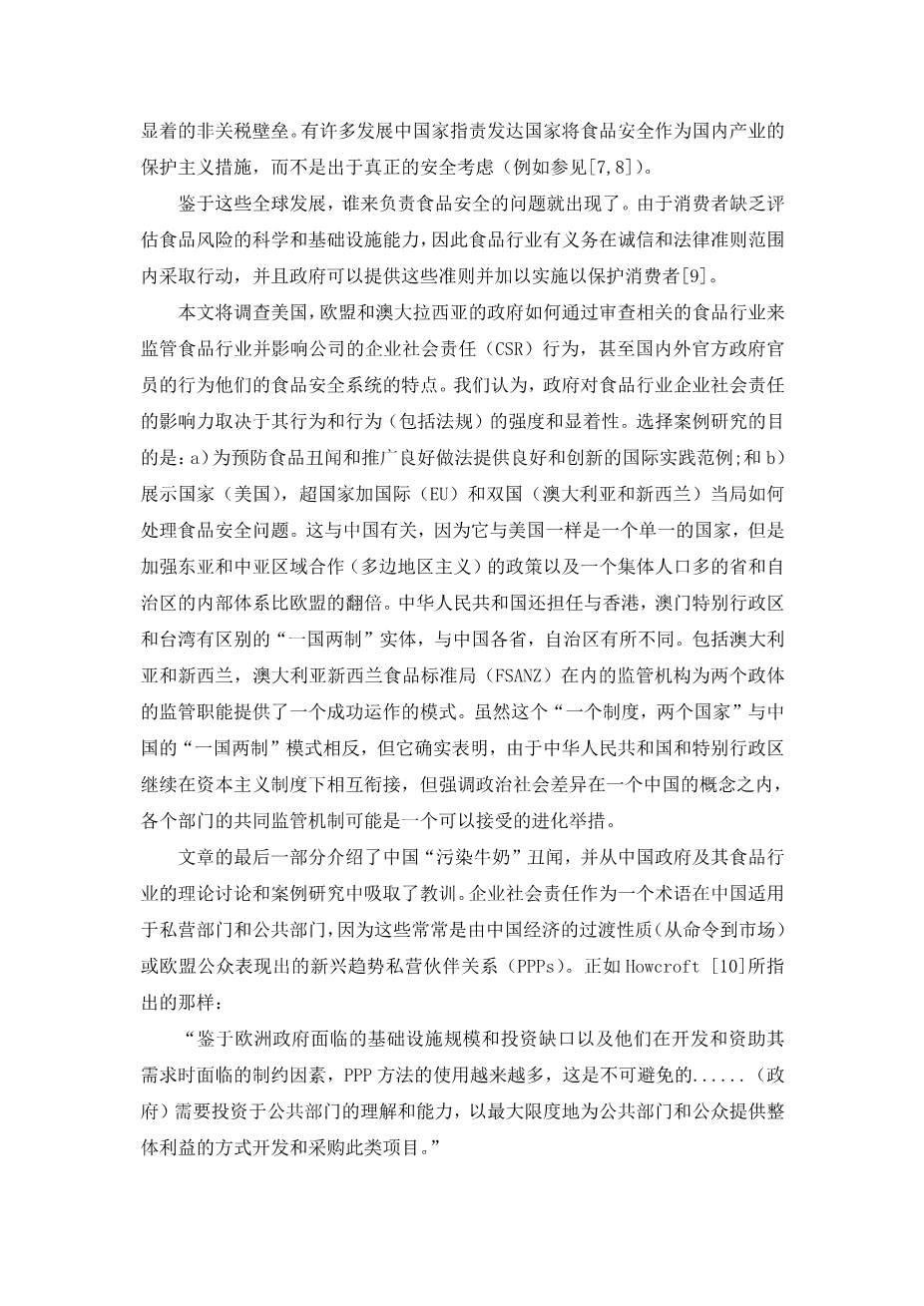Food Safety and the Role of the Government: Implications for CSR Policies in China
Rosita DELLIOS1 , Xiaohua YANG2*, Nadir Kemal YILMAZ3
Associate Professor of International Relations, Bond University, Gold Coast, Australia; 2 School of Business and Management, University of San Francisco, San Francisco, United States; 3 Investment Professional, Fiskiye Sok, Ankara, Turkey; *The Corresponding Author.
ABSTRACT
This study investigates food scandals and the role of government in corporate social responsibility (CSR) in the food industry and explores strategies for the Chinese government to tackle the food safety problems that abound in China. Based on the theoretical discussion of four types of CSR and the empirical evidence from four case studies, we argue that government influence on CSR in the food industry is determined by the intensity and salience of its own behavior and actions including regulations. We further believe that a balanced CSR strategy covering economic, legal, ethical and philanthropic considerations would work best for China. Our contributions include extending the CSR literature to the food industry and emerging economies like China and recognizing the distinctive role the government plays in the food industry. In addition, we provide a timely guide to establishing a food safety system in China.
Keywords: Corporate Social Responsibility, China, Food Safety, Emerging Market
- Introduction
Food safety is an issue that remains unresolved in both the developed and developing world. Barely having recovered from the shock of “mad cow disease” emanating from the UK in the 1990s, the 2008 “tainted milk” crisis in China serves as a reminder that the problem of food safety has not been contained or adequately addressed. The World Health Organization [1] reports a rise of 30 percent in the number of people in developed countries who become ill from foodborne diseases each year. Smith and Riethmuller [2–4] provide numerous other examples that show foodborne diseases do not discriminate between rich and poor countries with many cases having occurred in Industrialized economies: these range from Japan’s 1996 radish sprouts food poisoning incident that resulted in 10 deaths and 9,000 people being ill, to the “Arnotts Biscuits poisoning, the Australian peanut paste products affected by salmonella bacteria and the Jack in the Box contaminated beef incident in the USA”. So why is food safety still a problem, and a growing problem at that, in the world today?
Apart from the food safety systems still being a “work in progress ” irrespective of which country one wishes to consider [5], Riethmuller and Morison [6] have identified at least three reasons for the growing importance of food safety issues. The first concerns changes in food consumption patterns. People are eating out more, resulting in greater consumer awareness of hygiene. Second, manufactured food products and prepared meals are available through supermarkets and other food outlets, so that the onus is on these food retailers to ensure hygiene standards are adhered to. Third, food safety has become a notable non-tariff barrier in international trade. There are numerous examples of developing nations accusing developed ones of using food safety as a protectionist measure for domestic industry rather than for genuine safety concerns (see, for example, [7,8]).
In view of these global developments the question of who is responsible for food safety arises. As consumers lack the scientific and infrastructural capacity to evaluate food risk, it is incumbent on the food industry to act with both integrity and within the legal guidelines, and for governments to provide those guidelines and enforce them for the consumer’s protection [9].
This article will survey how governments in the United States, the European Union and Australasia regulate the food industry and influence the corporate social responsibility (CSR) behavior of companies—and even the official world of governmental authorities at home and abroad-by examining the relevant characteristics of their food safety systems. We argue that government influence on CSR in the food industry is determined by the intensity and salience of its own behavior and actions including regulations. The case studies have been selected for the purposes of: a) providing exemplars of good and innovative international practice in prevention of food scandals and promoting good practices; and b) showing how national (USA), supranational-plus-international (EU), and bi-national (Australia and New Zealand) authorities handle food safety issues. This is of relevance to China in that it is a unitary state like the USA, but with a policy of strengthening regional cooperation in East and Central Asia (multilateral regionalism) as well as an internal system of provinces and autonomous regions whose collective population size more than doubles that of the EU. The PRC also functions as a “one country, two systems” entity with regard to the Special Administrative Regions of Hong Kong, Macao and potentially Taiwan that are different to the provinces and autonomous regions within China. The regulatory authority that covers Australia and New Zealand, Food Standards Australia New Zealand (FSANZ), provides a successfully functioning model for a regulatory function across two polities. While this “one system, two countries” is the reverse of China’s “one country, two systems” formula, it does show that as the PRC and its Special Administrative Regions continue to converge in terms of a capitalistic system but emphasize politico-social differences within the One China concept, a common regulatory mechanism across various sectors could be an acceptable evolutionary move.
The final section of the article profiles China’s “tainted milk” scandal and draws lessons from the
剩余内容已隐藏,支付完成后下载完整资料


英语译文共 7 页,剩余内容已隐藏,支付完成后下载完整资料
资料编号:[468325],资料为PDF文档或Word文档,PDF文档可免费转换为Word


